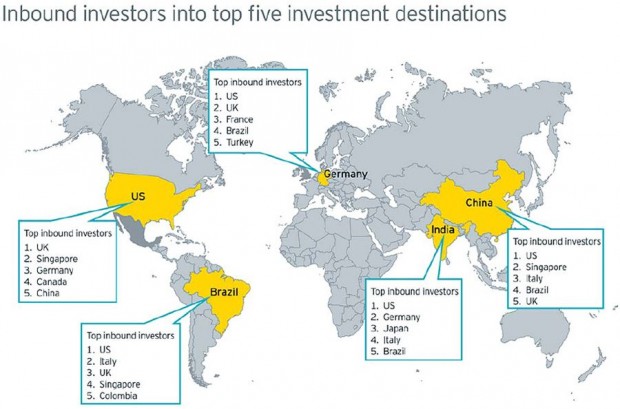Korean firms need to focus more on fundamentals
Korean companies have a more pessimistic outlook than their global counterparts about the world economy and the likelihood of its improvement, a sentiment that is affecting to further depress merger and acquisition (M&A) activities as well.
According to Ernst & Young’s latest biannual capital confidence barometer (CCB) survey, where more than 1,500 senior executives in 41 countries around the world shared views on economic outlook and their capital agenda, just 4 percent of Korean respondents saw global economic conditions improving.
It marks a steep nosedive from the 80 percent that saw improvement in the previous survey just six months ago and is also lower than the 22 percent of global respondents in the latest survey who thought the global economy is improving.
Global CCB is a regular survey of senior executives from large companies around the world, conducted by the Economist Intelligence Unit (EIU). It is aimed to gauge corporate confidence in the economic outlook and identify boardroom trends and practices in the way companies manage their capital agenda.
Korean executives, in the latest survey made public last month, were rather bullish about their local economy and about the prospects for corporate earnings. Yet, the country’s dependence on global markets means that concerns about global economy are predominant.
“In this regard, the interdependence between South Korea and China is particularly significant,’’ said Yoo Hong-yeol, transaction advisory services leader at Ernst & Young Korea. “The impact of the Eurozone crisis and the Chinese markets’ ability to sustain themselves remain key concerns for many Korean companies.’’
Eurozone fallout
More than two-thirds of Korean respondents, or 73 percent, saw the global economic downturn would last for one or two years, higher than the 51 percent of global respondents who said the same. An overwhelming 98 percent of Korean executives say they are feeling the impact of the continuing Eurozone crisis, similar to the 89 percent of their global peers who said the same.
Such results are hardly surprising given the extent of Korean companies’ trading relationships overseas. When asked about the most significant challenges facing their business as a result of the problems in the Eurozone, 62 percent identified revenue and margin pressures, followed by supply chain risk (52 percent) and counterparty default risk (48 percent).
Under such situations, a majority of South Korean companies also keep their cautious attitude about debt levels. More than half of all Korean respondents (54 percent) report rising confidence in the availability of credit globally, up from a mere 4 percent in April, and compared with just 26 percent of the global sample.
Just 8 percent of Korean executives said their company plans to refinance its debt in the next 12 months. By contrast, 26 percent of global executives say their companies intend to refinance debt obligations during the next year.
“These responses tell a more complex story,’’ says Yoo, the transactions advisory service leader. “While companies are reluctant to increase their leverage in an unfavorable global economic climate, they have ready access to financing in local capital markets, making debt a more attractive form of deal financing.’’
Growth still in focus
Despite the gloomy economic backdrop, growth remains in focus for many Korean firms.
When asked to choose the company’s focus for the coming year, 46 percent of respondents chose “growth,” followed by “maintaining stability” (35 percent) and “cost reduction and operational efficiency” (19 percent). There was no respondents that their company is focusing on “survival” itself.
While both Korean and global companies are emphasizing “organic growth,” a majority of Korean respondents, 63 percent, said they will pursue this strategy through the exploitation of technology to develop new markets and products, similar to the approach of executives in neighboring China. By contrast, the largest proportion of global executives, 26 percent, said they would focus on more rigorous production of core products and on existing markets.
Although Korea’s economy remains relatively stronger than others, the global insecurity and worries about its impact on cash flows are driving a more conservative approach. Many say they are continuing to decrease their debt-to-capital ratios.
Reflecting this emphasis, 69 percent of Korean respondents said their company’s main focus with excess cash over the next 12 months would be on paying down debt. None of the respondents expressed an intention to use excess cash to focus on “inorganic growth,” or growth by M&As.
But there are other factors undermining the South Korean appetite for M&As ― in particular, continued concern about valuations. Indeed, expectations of widespread opportunities in the wake of the Eurozone crisis amid weak global economy have been deflated in recent months, a phenomenon that has also been evident in the same survey of Chinese executives.
Some 67 percent of Korean executives said they expect valuations to decrease over the next 12 months, more than twice the percentage of global respondents who said the same. South Korean companies seem clearly waiting for the price gap to narrow down before they venture back into the M&A market.
With a recovery taking longer than expected, Yoo concluded, South Korean companies should focus more on fundamentals. Chief financial officers (CFOs), in particular, are advised to revisit their key capital agenda items including how to preserve, optimize, raise and invest capital based on an accurate analysis of the current business situations for more bottom-line performance improvements and lower risk opportunities instead of top-line growth.
Out of the 1,500 executives who took part in the latest global CCB survey, 52 were from Korean companies, one-third of which had annual revenue of more than $5 billion. Industry sectors ranged from technology, automotive, power and utilities as well as financial services, retail and wholesale and so on.
This article was contributed by Ernst & Young, a leading global professional services firm. <The Korea Times>





